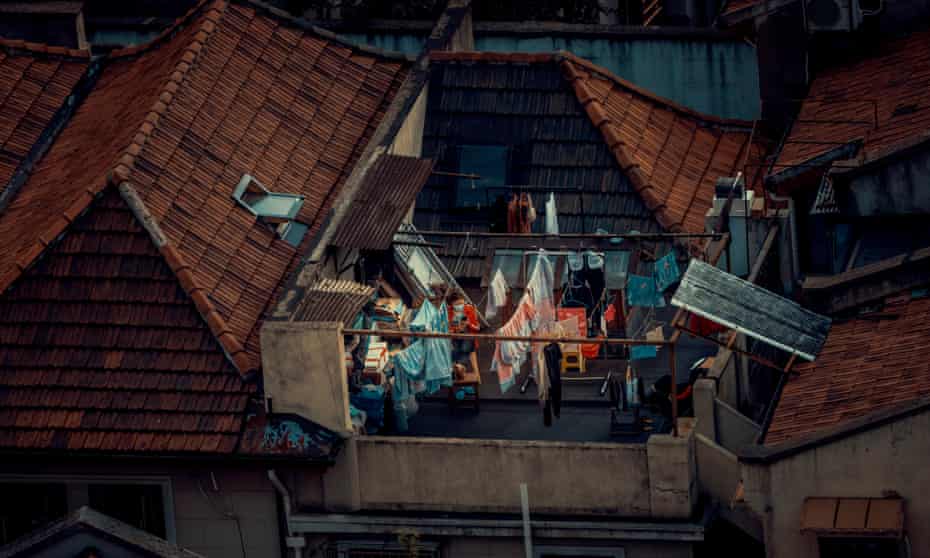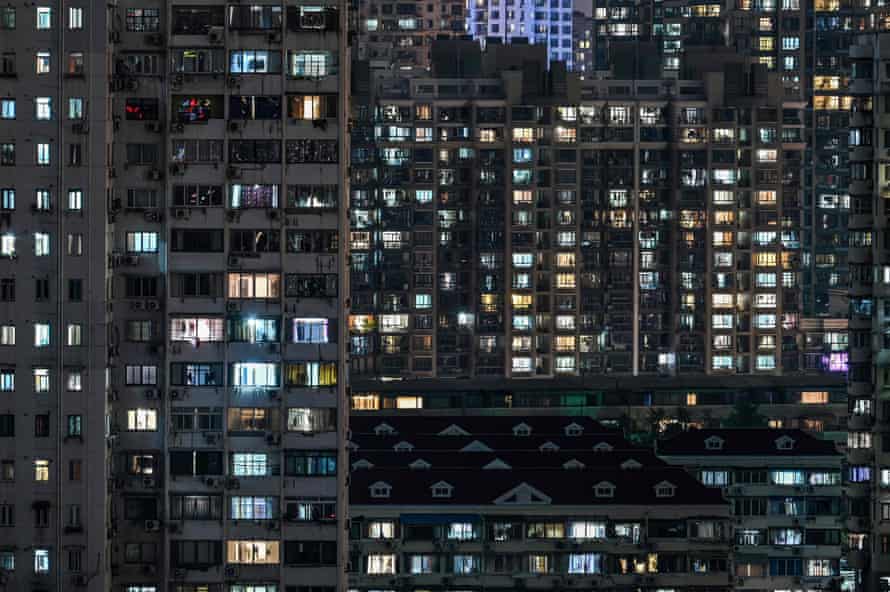by Helen Davidson
With 340m people living under lockdown or restrictions, the administration are sticking to their stance. But at what cost?
Across much of the world people are taking international holidays, returning to the office, and going to festivals and political rallies. Faced with the seemingly unstoppable Omicron variant, they’ve decided to live as close to normality as they can in the presence of Covid-19, limiting its impact. But in Covid-zero China it’s a vastly different story.
An estimated 340 million people in at least 46 cities are under some form of lockdown or restrictions in China, as cases appear in multiple provinces – often in so far tiny quantities.
On Thursday Guangzhou authorities grounded hundreds of flights after the detection of a suspected case. In Hangzhou all residents have been told to test every 48 hours if they want to travel around the city.
In Shanghai some residents are hanging out their windows banging pots and pans in nightly protest at a weeks-long lockdown beset by food shortages. A loudspeaker driven through the streets tells them their protest has been “incited by foreign forces”, while flying drones urge they “control your soul’s desire for freedom”.
In the capital, Beijingers are stocking up on food in case of a Shanghai-style lockdown as dozens of new cases are recorded each day, prompting lockdowns of residential buildings, the closure of schools and suspension of weddings, funerals and banquets.
On the official evening news broadcast, little of this makes the cut. Instead the story is of successes in the battle to regain zero-Covid. More than two years into the pandemic, China is the last major government still committed to the policy, determined that even the uber-transmissable Omicron variant will be controlled through mass testing, travel curbs and lockdowns.
’We try to run faster than the virus’
China’s officials maintain their approach is the best for both lives and the economy, and they have no choice but to hold firm on their approach. China’s booster and vaccination rates, especially among the elderly, are not high enough and its medical system not sufficiently resourced or geographically equitable to avoid catastrophic illness and death.
“We try to run faster than the virus,” Li Bin, deputy director of the China’s National Health Commission, said on Friday. “No matter how the virus evolves we always put people and their lives first.”

Foreign analysts and health experts agree China can’t open up yet. They also point to questions over the efficacy of its domestic vaccines, and the refusal of the government to approve foreign-made vaccines. Even if it did, a year of propaganda criticising them has likely ensured few people will be keen.
But the analysts also fear China won’t join the world in living with Covid even when conditions are better. They say zero-Covid is so deeply tied to the political legitimacy of the Chinese Communist party and its leader, Xi Jinping, that there is no off ramp.
As the impact of zero-Covid chafes the people’s will and the economy’s health, and a growing outbreak in the capital, that legitimacy may be under threat.
“The CCP’s political legitimacy of power lies in its ability to provide livelihood, safety and health. They have to show their competency,” said Prof Chi Chunhuei, the director of Oregon State University’s centre for global health. “But local leaders also face a dilemma because they’re also tasked with improving or increasing China’s economic growth.”
Xi’s biggest challenge?
Zero Covid has undoubtedly saved lives, but other consequences of keeping the policy are biting. Economic analysts are forecasting continuing slowdowns in growth, and investors pulled a record $17.5bn in stocks and bonds out of China’s market in March.
Cargo ships and trucks have been backed up at ports and roads, factories stalled and warehouses at capacity. Foreign firms have pulled out of the Shanghai, or reported major problems in attracting and retaining talent. Finance workers and international teachers are reportedly packing up and leaving.
Online and in Shanghai, there is a significant and public amount of domestic frustration which police and censors are struggling to keep up with.
In apparent acknowledgement of the toll the pandemic was taking, last month Xi ordered officials to succeed with zero Covid but “at the least cost and [to] minimise the impact of the epidemic on economic and social development”. This month Xi called for all-out efforts to spur infrastructure spending, pushing public development in a bid to drive the economy forward.

There is very little space for officials to question Xi’s Covid goals, saysProf Carl Minzner, China scholar and professor of law at Fordham Law School, but resistance is there.
“There are people in bureaucracy who realise the real cost this is imposing on citizens,” says Minzner. “But when politics is in command there isn’t this space for anything to rise up as reasoned discourse.”
Dissenting opinions among the political and medical elite are occasionally going public but are quickly scrubbed from the internet, and years of Xi’s anti-graft purges have removed or silenced many political opponents.
Later this year the CCP will hold its twice-a-decade congress, at which Xi is expected to seek an unprecedented third term as leader. In recent years it’s been spoken of as largely inevitable, but the timing and impact of China’s worst outbreak, as well as the Ukraine war, has upset the stability he likely hoped would see him confidently through.
“There is some potential that a failure of zero-Covid, now he’s taken such clear responsibility for it, is a challenge to Xi,” says Prof Mary Gallagher, a political scientist and China expert with the university of Michigan.
“We’re in uncharted waters in how these transitions work. With constitutional amendments [introduced in 2018 to remove term limits] Xi is expected to get his third term but it’s very unclear to see how it would actually happen.”
Gallagher says the political elite is the most divided she’s seen it since 1989, over not just Covid, but also the economy and the Russian invasion of Ukraine.

“We know there is debate among the elites. Unfortunately it’s hitting up against a time period for Xi Jinping which makes it very dangerous to open up.”
Shanghai’s attempts to avoid the lockdown were potentially overconfidence, says Gallagher, or an example of dissent among leaders who wanted to go a different way, says Chi.
“Shanghai is the largest city with the richest health and medical care resources,” Chi says, arguing the reason officials initially resisted a lockdown was because it would send a ripple effect throughout the nation: “If the best resourced city has to lockdown [to contain an outbreak] then what happens to other cities?”
But it backfired as cases overwhelmed the city, forcing 25 million people into lockdown anyway.
‘No solution has been developed’
After five weeks, Shanghai officials announced on Friday that more than 12 million people in districts now deemed low risk were able to leave their homes, but residents say there are still issues.
Wang Yi-chun, a 27-year-old Shanghai resident who did not want to use her real name, says she’s been allowed to leave her apartment, but rules change quickly and without notice, and she wishes she’d left the city when she had the chance.

“Before the lockdown in Shanghai, I never imagined that things would go to this level,” Wang says. “I thought they’d have some process that prepared them to face situations like this. But they didn’t have any.No solution has been developed during all this time. I don’t understand what they are doing right now.”
Beijing is now reporting dozens of cases a day, but as of Friday was only locking down individual residences and venues. Aside from panic buying things seem calm as residents in affected districts report for testing. There is faith in Beijing’s authorities doing a better job than Shanghai’s, but still with the usual arsenal of measures.
“Xi Jinping declared victory over the virus in 2020, and [pandemic] success has become emblematic of his own personal political success, ” says Minzner.
“Unless Xi himself decides to back down politically, I find it difficult to imagine how China retreats from a zero-Covid policy.”
Additional reporting by Xiaoqian Zhu and Chi Hui Lin
Helen Davidson
Source: https://www.theguardian.com/world/2022/apr/29/china-xi-jinping-zero-covid-lockdown-vaccination
No comments:
Post a Comment